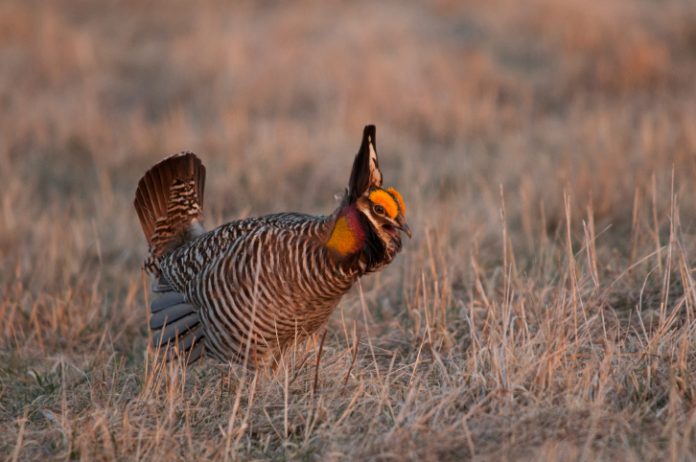With the support of President Joe Biden, the U.S. Fish and Wildlife Service (FWS) has proposed adding the lesser prairie chicken to endangered species list.
Under the 1973 Endangered Species Act (ESA), listing the lesser prairie chicken as endangered would require establishing critical habitat and setting restrictions on land use across the species range to enable the bird to recover.
Much of the lesser prairie chicken’s five-state range includes prime oil and gas drilling locations. Based on the experience with other endangered species recovery plans, private land owners, industry, and state and local officials have expressed concern that listing the lesser prairie chicken as endangered may severely limit agricultural and oil and gas operations.
Chicken History
The lesser prairie chicken is a species of grouse indigenous to arid short-grass regions of the southern Great Plains in Colorado, Kansas, New Mexico, Oklahoma, and Texas.
Populations declined to an estimated 15,397 birds in 2013, believed to be a record low.
Since that time, under a voluntary conservation plan developed by private land owners in consultation with state and local officials, lesser prairie chicken populations more than doubled. Lesser prairie chicken numbers rebounded to 34,408 in 2020, according to the most recent annual report by the Western Association of Fish and Wildlife Agencies.
Obama Rule Vacated
During the administration of President Barack Obama, FWS listed the lesser prairie chicken as “threatened,” under the ESA in 2014.
The Permian Basin Petroleum Association among other groups sued to overturn FWS’ listing, pointing out a voluntary conservation plan had been developed and “more than 180 oil and gas, pipeline, electric transmission, and wind energy companies” had enrolled in it.
U.S. District Judge Robert A. Junell overturned FWS’s listing, finding the agency had not followed its own guidelines requiring voluntary conservation efforts to be taken into account when considering a listing decision.
“[FWS} did not properly consider active conservation efforts for the bird when listing it,” Junell’s ruling said. “The Court finds FWS did conduct an analysis, however this analysis was neither ‘rigorous’ nor valid as FWS failed to consider important questions and material information necessary to make a proper evaluation.”
Motives for Listing Questioned
With the lesser prairie chicken recovering, one must question what the Biden administration’s true motivations are for requesting the bird be listed as endangered, says. Byron Schlomach, Ph.D., director of the Oklahoma-based 1889 Institute.
“As late as 2018, lesser prairie chicken conservation efforts in Oklahoma and neighboring states had resulted in a 30 percent increase in the bird’s population in a single year,” Scholmach said. “It is clear that a federal endangered species listing is unnecessary.
“A look at the bird’s range makes it obvious what the real motivation is, because the range happens to coincide with some of the richest shale oil deposits in the nation, most of it on private lands which the Biden administration can’t limit with its moratorium on new leases on federal lands,” Schlomach said. “The Biden administration is determined to destroy this country’s oil industry; and this effort is about requiring federal permission to drill new wells where such permission has never been necessary before.”
‘Limits Landowner Autonomy’
The Biden administration’s lesser prairie chicken listing is an attempt to further extend federal control over private property and oil and gas production, said Sen. Roger Marshall (R-KS), in a statement.
“The U.S. Fish and Wildlife Service’s announcement is disappointing and a reminder that this Administration favors government overreach and heavy handed regulation over cooperation with those who have been working to protect the lesser prairie chicken’s habitat and growing the bird’s population across the Midwest,” Marshall’s statement said. “Instead of working with landowners to promote continued voluntary efforts the service is instead implementing a listing that limits landowner autonomy and opportunity.
“Today’s announcement will hurt our state’s economy, hinder our oil and gas independence, increase utility costs, and prevent the development of renewable energy in prime Western Kansas locations,” Marshall said.
Kevin Stone (kevin.s.stone@gmail.com) writes from Arlington, Texas.
Official Connections:
Sen. Roger Marshall (R-KS): https://www.marshall.senate.gov/; https://www.marshall.senate.gov/contact/contact-form/



























Just another barrier in a growing line of decisions that will hamper domestic oil & gas development. As gasoline prices continue to go “north” across the U.S within the next 12-15 months, voters will rightfully know who to punish in the 2022 mid-terms…